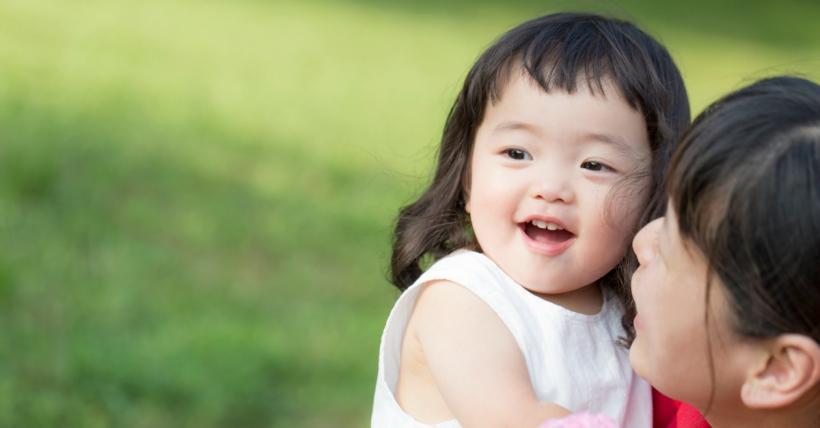
My daughter is about as sweet as they come. Image: Thinkstock.
“It’s OK, Mommy,” she said. “You OK? It OK.”
I am not exaggerating when I say my daughter is a sweetheart. I mean, she’s also smart, strong, sassy, and hella funny; but her hugs are tender and full, her words are genuine and sincere, and her kisses are gentle and… well, kinda sloppy. (What can I say? She’s a sometimes slobbery toddler. But I digress.) In other words, my daughter is loving. My daughter is compassionate. And my daughter — my two-and-a-half year old “baby girl” — is about as sweet as they come.
But how do I know she is empathetic? How do I know she is able to relate to others — to vicariously understand and identify with the thoughts, feelings, or experiences of others — and then respond in a caring and helpful way? Because of the things she does, the words she speaks. Because of the way she loves.
You see, every time we watch The Lion King — every freakin’ time Mufasa dies — her small fists ball up, her nose and brows furrow, and tears well up in her eyes. But instead of worrying about herself, she asks, “Mommy, what happen? Dis sad?” She pauses and waits for my response, but when I let silence linger a moment too long, she asks again, “Dis sad, Mommy? Dis sad?”
Of course, I tell her the truth: I tell her it is sad, and it’s OK to feel that way. But when I explain why the scene is sad — when I explain Mufasa has died (i.e. his body stopped working) — I can feel her little body tense up. She snuggles in close and, in a whisper, asks, “He OK? Is he OK?”
But the “he” she is worried about isn’t Mufasa. “He” is Simba. “He” is Mufasa’s son.
Her empathy exceeds well beyond cartoons, though. When Daddy is sick, she tries to take care of him; when our cat Metroid meows, she tries to feed him. In fact, one afternoon — when I was having a difficult day, when my depression came to a head and I was crying while she watched Sofia the First — she reached up, kissed my head, and then hugged me. Why? Because I previously explained my mental illness to her: i.e. I told her Mommy has a boo-boo, and sometimes Mommy’s sad. Sometimes Mommy’s boo-boo makes her head hurt. Sometimes it makes her heart hurt.
And she heard me.
She tried to soothe and help me. She listened when I spoke, internalized my words, and remembered. Her empathy allowed her to remember.
However, her empathy was most apparent on Super Tuesday, when Mommy was working to cover the news and she (of course) wanted my attention. When she wanted to “play tent.” After screaming and crying, yelling, pushing, and whining because I couldn’t play with her — because I wouldn’t play with her — I snapped. Instead of responding patiently or explaining why Mommy couldn’t attend her tea party or read stories, I found myself screaming. I found myself yelling, both at her and for me.
With six, simple words my daughter reminded me that it’s going to be OK. It doesn’t have to be good or great, but OK. Just OK.
Immediately after, I felt like crap. Immediately after, I cried. Immediately after, I stopped working, followed her into her room, and apologized.
And what happened next floored me. What happened next helped me as much as it hurt me. “It’s OK, Mommy,” she said. “You OK? It OK.”
Six words. With six words, she managed to hold my heart … and hurt it. With six small words, she reminded me the importance of patience and forgiveness. And with six, simple words my daughter reminded me that it’s going to be OK. It doesn’t have to be good or great, but OK. Just OK.
My daughter — my two-and-a-half year old “little” girl — showed compassion. She displayed sympathy. She was the epitome of empathetic.
Don’t get me wrong: For days, this encounter left me riddled with guilt. For days, I questioned everything I was doing with my profession, and in my life. For days I felt remorseful and sorry. I felt like a “bad mom.” (I mean, who the hell ignores their little one’s pleas for attention and love?) But then I went to my therapist and she framed the entire incident differently; she put everything in perspective: What if I wasn’t neglectful or bad and I was instead showing my daughter what a strong, intelligent, and independent woman looked like? What if I was modeling important ideals for her — what it looked like to be a hard-working, dedicated, responsible multitasker, and mom — and not just negative ones?
Immediately, I knew she was right. But I still felt awful. I still felt terrible. I mean, what about my daughter’s response? Did my behaviors make her feel ignored and unimportant? Did I hurt her or, worse, damage her? Was the measly paycheck worth a lifetime of pain and insecurity?
My therapist’s response was simple: Define neglect. Define what makes you a “bad mom.”
You see, she was right: Empathy is a gift, and it’s a gift I’ve given my daughter. I didn’t mean to “make her empathetic”… It just happened.
Of course, I couldn’t come up with a damn thing, so instead of answering her question, I explained my daughter’s reaction. (Because clearly, she didn’t understand. Clearly, she wasn’t grasping just how my daughter acknowledged my feelings and “played parent”). When I was done, she smiled and said, “That’s great, Kim! Don’t you see how great that is? Your daughter was being empathetic, and empathy is such a difficult emotion to grasp. Where do you think she learned that from?”
I paused because I knew where she was going. I knew what she was implying: i.e the best way to teach empathy is to model empathy (and a two-year-old’s “models” are their parents and/or caregivers). But I didn’t feel that way. I still felt like a bad mom, at least until I thought about it. Until I sat back and processed our conversation.
You see, she was right: Empathy is a gift, and it’s a gift I’ve given my daughter. I didn’t mean to “make her empathetic” or even plan to — it wasn’t as though we had empathy lessons after story time and before we worked on our ABCs.
It just happened. Through observation, through sorta shitty circumstances, and through behaviors I am not always proud of. Through words I wish I could take back.
Hopefully, she will be a more compassionate and open-minded child because of it. Hopefully, she will become a well-adjusted adult because of it. But I know I am a better adult because of it, and not because of my empathy, but because of hers. Why? Because with six words, my daughter reminded me that people make mistakes — that I make mistakes. With six words, my daughter reminded me that I have a choice, and we all have a choice: We can face anger with anger, or with tenderness. We can confront sadness with anguish and grief, or with kindness. And we can face tragedies with hatred, denial, and fear, or with benevolence. With grace, with love, and with humanity.
And if a 2-year-old can remember that people get frustrated and annoyed, angry or upset, and sometimes speak out of turn or act in haste — and still keep an open heart and mind — maybe I can remember it, too.
Maybe we can all remember it.
"My 2-Year-Old Is the Most Empathetic Person I Know" by Kim Zapata originally appeared on Babble.com.
More from Babble:







